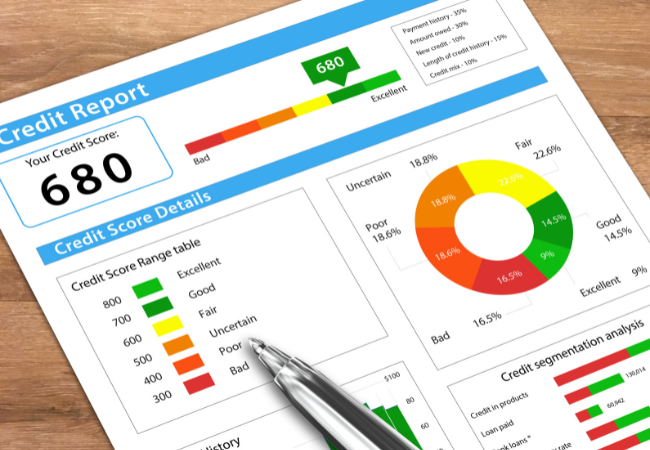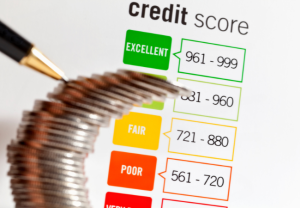A credit score is a crucial factor that lenders consider when assessing your loan applications. It reflects your creditworthiness and helps lenders determine the level of risk in lending to you. Whether you’re planning to apply for a mortgage, a car loan, or a credit card, having a good credit score is essential.
But how do you check your credit score? Luckily, there are several convenient methods available.
One way to check your credit score is by requesting it from your credit card company or financial institution. Many financial institutions provide access to credit scores as part of their services, allowing you to keep track of your creditworthiness easily.
Additionally, you can use credit score services that provide comprehensive reports and scores from multiple credit bureaus. These services often offer additional insights into factors that affect your credit score, such as payment history, credit utilization, and more.
If you’re looking for a free option, there are also credit scoring sites that allow you to check your credit score online without any cost. These sites provide a convenient way to monitor your credit and understand where you stand financially.
Remember, checking your credit score regularly is important to ensure its accuracy and address any issues promptly. By staying informed about your creditworthiness, you can take the necessary steps to improve your score and increase your chances of securing favorable loan terms in the future.
Key Takeaways:
- Checking your credit score is crucial for understanding your creditworthiness and securing favorable loan terms.
- You can check your credit score by requesting it from your credit card company or financial institution.
- Credit score services provide comprehensive reports and insights into factors affecting your creditworthiness.
- Free credit scoring sites allow you to check your credit score online at no cost.
- Regularly checking your credit score helps you stay informed and address any inaccuracies or issues promptly.
Understanding Credit Scores and Factors Affecting Them
A credit score is a numerical representation of your creditworthiness and ranges from 300 to 850. It is a key factor used by lenders to evaluate your creditworthiness and assess your ability to repay loans. Understanding how credit scores are calculated and the factors that affect them is crucial for maintaining a healthy financial profile.
Several factors contribute to your credit score, each carrying a different weightage:
| Factors | Weightage | Description |
|---|---|---|
| Payment History | 35% | Reflects whether you make timely payments on credit accounts |
| Credit Utilization | 30% | Measures the amount of credit you are using compared to your total credit limit |
| Length of Credit History | 15% | Considers how long your credit accounts have been open |
| New Credit Applications | 10% | Accounts for recent inquiries and credit accounts |
| Credit Mix | 10% | Considers the types of credit accounts you have (e.g., credit cards, loans, mortgages) |
A good credit score is generally considered to be 670 or higher. Higher scores indicate better creditworthiness and can make it easier to qualify for loans with favorable terms and lower interest rates.
It’s crucial to monitor your credit score regularly to identify any negative factors that could be impacting it. Understanding the factors that influence your credit score allows you to make informed financial decisions and take steps to improve or maintain a good credit score.
Use the image above to visualize how the factors affecting credit scores contribute to your overall creditworthiness.
How to Improve Your Credit Score
Improving your credit score is essential for securing favorable loan terms and financial opportunities. By following these steps tailored to your specific situation, you can take control of your creditworthiness and enhance your financial well-being.
The first step is to pay your bills on time. Timely payments are crucial, as even a single missed payment can have a lasting negative impact on your credit score for up to seven years. Set up automatic payments or create reminders to ensure you never miss a due date.
Additionally, paying down your credit card balances can significantly boost your credit score. Aim to keep your credit utilization, which is the amount of credit you’re using compared to your total credit limit, below 30%. Lower utilization shows creditors that you’re responsible with credit and improves your score.
Avoiding frequent credit applications is another key factor in improving your credit score. Each credit application results in a hard inquiry on your credit report, which can negatively affect your score. Minimize unnecessary credit applications to maintain a positive credit history.
Furthermore, dispute any inaccurate credit information on your credit report. Errors can lower your credit score, affecting your borrowing potential. If you find any discrepancies, contact the credit reporting agencies and provide supporting documentation to rectify the inaccuracies.
To accelerate your credit score improvement, consider using services like Experian Boost. It allows you to add positive payment history, such as utility and phone bill payments, to your credit report. This can help increase your credit score and demonstrate responsible financial behavior.
Finally, regularly check your credit reports to ensure accuracy and identify any potential issues. Monitoring your credit allows you to catch errors, detect identity theft, and maintain a clear understanding of your credit standing.
Remember, improving your credit score takes time and consistent financial habits. By paying bills on time, reducing credit card balances, avoiding unnecessary credit applications, disputing inaccuracies, and monitoring your credit reports, you can enhance your creditworthiness and open doors to better financial opportunities.



